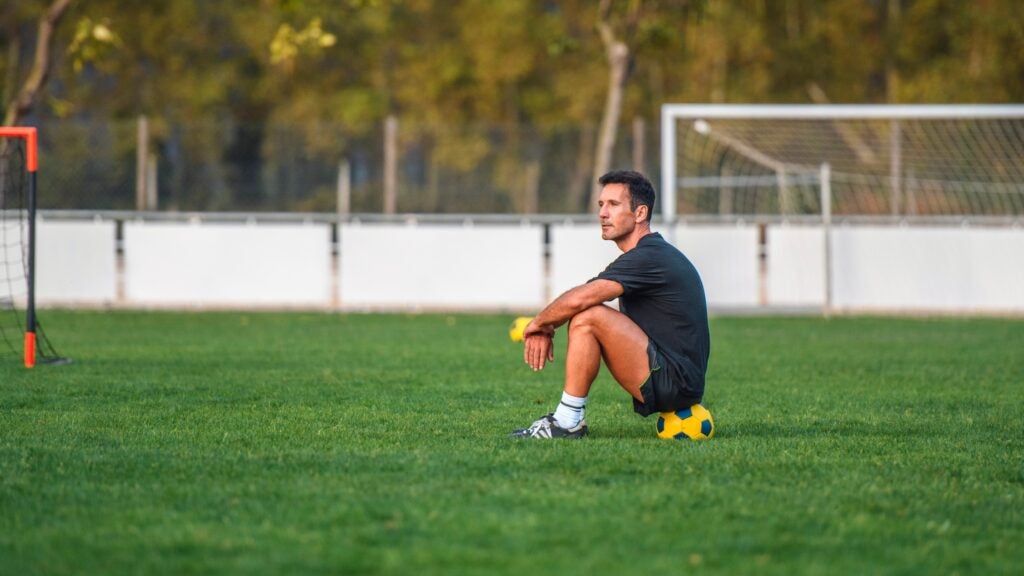No products in the cart.
Outdoor Adventure
My Boyfriend Is a Sore Loser. Will He Get Over It?
Heading out the door? Read this article on the Outside app available now on iOS devices for members!
Download the app.
Welcome to Tough Love. We’re answering your questions about dating, breakups, and everything in between. Our advice giver is Blair Braverman, dogsled racer and author of Small Game and Welcome to the Goddamn Ice Cube. Have a question of your own? Write to us at toughlove@outsideinc.com.
My boyfriend recently joined an adult hockey league for the first time in his early thirties. He grew up in Maine and played hockey with his friends as a kid, but this is his first time on a team, and he’s been going all in. He loves it. He has sometimes had trouble getting out and making friends, so I have been doing everything I can to encourage it. I also come to his games when I can and cheer him on.
When his team wins a game, he’s on top of the world. But when he loses, he gets crabby and unpleasant to be around. To be clear, he’s extremely kind and loving, and never gets mean, but I still find myself getting anxious even partway through the game if it seems like things aren’t going well, because I’m anticipating how he’ll be irritable if they lose. This is the only downside to his new hobby but it’s enough to make me dread it a little. Is this just because he hasn’t played team sports much? Is there hope that he’ll learn to be less of a sore loser?
It seems totally normal that your boyfriend would be crabby when he loses a game—after all, this is something he cares about and works hard for—but it’s the degree of crabbiness that makes all the difference. Is he just bummed out, irritable, and takes a few hours to wind down? Or does it seem like his unhappiness after a loss is affecting his self-image and quality of life (or yours)? Is he taking his frustration out on other people, or is it just upsetting for you to witness it in general? The problem might be that he takes losses personally, but it might also be that you’re taking his emotions personally, and are trying to get involved and fix things when you could just take a step back and let him work through his disappointment on his own.
In any case, it’s always good to have an honest conversation. “The mistake people make is talking about a problem when someone’s already emotional,” said Leslie Gaynor, a licensed counselor who helps people with their relationships, when I shared your situation with her. “You should wait until he’s in a good mood, when you’re having coffee or something, and then bring up how you feel about the ways he acts when he loses a game.” If your boyfriend’s up for it, she recommends asking about his actual thoughts after a loss, rather than focusing on his emotions. Does he think that losing a game means something about him? “He might say something like, ‘It means that other people are better than me.’ Well, then, there you go: he thinks he’s not good enough, and that this proves it. That realization can give him an opportunity to practice proving those thoughts wrong. What has he done right? What is he proud of? What has he excelled in?”
You could try a similar exercise on yourself, trying to figure out what thoughts you have when you start getting anxious that your boyfriend’s team is about to lose. Do you think that if you don’t help him feel better, something bad might happen? What, specifically, are you afraid of? I’m glad that your boyfriend’s never mean, as you said, but does he remind you of someone who’s hurt you in the past? Sharing those thoughts with your boyfriend might help him to reassure you, or to adjust his behavior so that it’s not triggering the same memories, anxieties, or fears.
You can also put your heads together to figure out what strategies would actually be helpful, for both of you, when your boyfriend’s in a bad mood after a loss. Is it possible that he just wants to have time and space to wind down on his own? He’s probably tired after a game, anyway, and fatigue makes it way harder to deal with rough emotions. He could play a video game or watch a show. Maybe he needs to eat, hydrate, shower, and take a nap, and once those physical needs are met, he’ll start feeling more like himself. For your part, you could call a friend, go out for a walk, or do something else you like. You might find that your anxiety is assuaged by something as simple as your boyfriend taking a moment to remind you when he’s feeling down after a game that he loves you and isn’t mad at you—that his disappointment is real, but it’s not about you at all.
I think that, with a little time, this problem will naturally work itself out. But if you’re still finding yourself anxious around game time, keep in mind that you can be plenty supportive of your boyfriend’s hockey passion from a distance. You should go to his games if you both enjoy it, but you can also wish him luck, give him a kiss, and let him know that you’re proud of him—and then go hang out with your own friends for the day.
Source link

